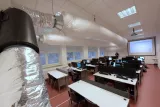Published: 12.01.2022
Scientists at the Centre for Materials and Nanotechnologies (CEMNAT), the Faculty of Chemical Technology at the University of Pardubice, have introduced a new air filtration system that effectively prevents SARS-COV-2 transmission indoors. The device, which significantly reduces the concentration of ultrafine aerosol particles, is being tested by Pardubice scientists at the university in cooperation with the Czech Academy of Sciences and the Czech Technical University in Prague (CTU).
So far, the prototype for about CZK 30,000 is filtering the air in one of the Faculty of Electrical Engineering and Informatics classrooms. The filtration system uses the principle of slow airflow through the filter fabric, thus being highly efficient at catching aerosol particles from the size of tens of nanometres. The filter, which resembles a giant sleeve, is suitable for and effective against all known viruses, including coronavirus, bacteria, and solid aerosol particles.
“We focused on the amount of air cleaned per unit time, not just the efficiency of the filter. That said, we could design a filtration device that is efficient, quiet and evenly distributing the filtered air in the room,” says Ing. Max Fraenkl, Ph.D. from CEMNAT, the University of Pardubice.
The speed with which the filtration device can clean, for example, an “infested” classroom was shown in tests conducted by scientists in cooperation with their colleagues from the Institute of Chemical Process Fundamentals, the Academy of Sciences of the Czech Republic. Its efficiency is supported by the fact that it can filter the classroom volume three times per hour. “From the moment an infected person leaves the classroom, our device can halve the number of coronavirus particles in ten minutes and reduce them to a mere one per cent within an hour,” said Max Fraenkl.
According to CEMNAT scientists, this filter innovation is an effective and cheap solution, both in power consumption and installation requirements. Making your own filter or replacing it is simple and comes with minimal costs. The device, whose purchase costs are three times lower than other commercially available solutions, can operate virtually unchecked for a long time. “Ideally, the filter system could find its use in classrooms, doctor’s waiting rooms, and offices. Quiet ventilators make teaching undisturbed by excessive noise. Placing the device near the ceiling does not hinder the normal operation or students’ activities in classrooms,” said the head of CEMNAT, Prof. Ing. Miroslav Vlček, CSc.
The air filter is yet another outcome of CEMNAT’s research in times of pandemic. At the “Science and Research Fight Pandemic” conference in 2020, the CEMNAT scientists presented a personal filter that doctors and health workers in developing countries with a lack of protective equipment could use instead of respirators. Known as Phoenix, the filter can be regenerated in boiling water, washed, and has a long life. The scientists have already published its final version with a detailed description of its properties and instructions for making it.


